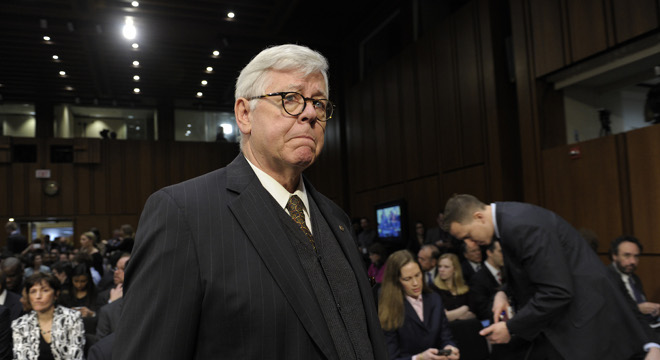The National Rifle Association has baffled some by fighting the post-Newtown push for gun control the same way it has in the past: digging in and refusing to give ground on anything, even wildly popular proposals like universal background checks.
On Thursday, NRA president David Keene explained the strategy: despite what people may think, he said, the aftermath of the school massacre in Newtown, Conn., is no different than past calls for gun legislation following a shooting. More than one observer has said that view misses the mark.
“Our opponents hope [this time is different] in the sense that they hope they can use emotion to achieve an anti-firearms agenda that they haven’t been able to achieve in the past,” Keene told reporters at a breakfast sponsored by the Christian Science Monitor. “I’ve always operated not just in my current incarnation but in previous incarnations in the assumption that people are smarter than politicians and that common sense ultimately prevails.”
Asked again if he thought things were different this time, Keene said “no.”
This belief explains a lot of the NRA’s post-Newtown strategy. Starting with its press conference a week after the Dec. 14 shooting, the NRA has rejected any call for new gun regulations as nothing but anti-gun groups hyping up Newtown. This is despite the moves by some of the gun lobby’s allies in Congress to draft new legislation for things like expanded background checks, which the NRA opposes.
But there’s data that suggests the NRA approach has missed the mark. On Monday, George Washington University political scientist Danny Hayes published data showing gun control has remained on the news radar after Newtown far longer than it has after past shootings. He attributed this in part to President Obama’s strong push for new gun laws.
Gun control groups have said they’re more powerful and meaner, too, ready to fight for gun control in the same way the NRA has opposed it in the past. New York City Mayor Michael Bloomberg has hired Republican lobbyists to push gun control on Capitol Hill, and he and other gun control supporters have begun targeting moderate Democrats who stand with the NRA against new laws.
The NRA’s post-Newtown playbook has confused some Republicans like MSNBC host and former Rep. Joe Scarborough. Some on the pro-gun rights side of things condemned the group’s controversial TV ad attacking the armed guards protecting President Obama’s daughters at school. An NRA senior lobbyist later called the spot “ill-advised.”
But NRA vice president Wayne LaPierre made an argument similar to the one in the ad — namely that it was hypocritical for “elitists” to have armed protection while calling for gun control laws — during Wednesday’s gun violence hearing in the United States Senate, suggesting the group isn’t dropping that line from its rhetorical quiver.
“If you’re in the elite, you get bodyguards, you get right here and you get high-cap mags with semi-automatics protecting this whole Capitol. The — the titans of industry get the bodyguards whenever they want. Criminals don’t obey the law at any — anyway, they get what they want,” LaPierre said, according to a Washington Post transcript. “And in the middle is the hardworking, law abiding, taxpaying American that we’re going to make the least capable of defending themselves.”
This approach is not doing the NRA any favors, some have said.
Robert Spitzer, chair of the political science department at SUNY-Cortland, has been watching the debate over gun control for a long time. He’s the author of four books on gun policy, including The Politics Of Gun Control. He told TPM Tuesday that gun control advocates have beaten the NRA at its own game in the weeks since Newtown, partially because the NRA refuses to acknowledge it’s a different world after the Sandy Hook Elementary School shooting.
“In terms of everything I’ve observed, I think they’ve been following very consistently with the approach they’ve used in recent years, and I frankly think they’ve done a terrible job. It’s just been so ham-handed, so defensive, so negative,” he said. “They could have sculpted it so much more shrewdly without making concessions.”
“They wouldn’t have had to do that to appear more reasonable-sounding at least,” Spitzer said. “Frankly if they’d paid me money I could write them a far better campaign. It’s just been terrible. They’re really not persuading anybody.”









